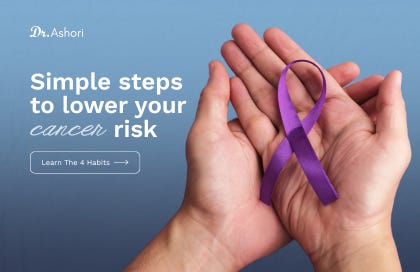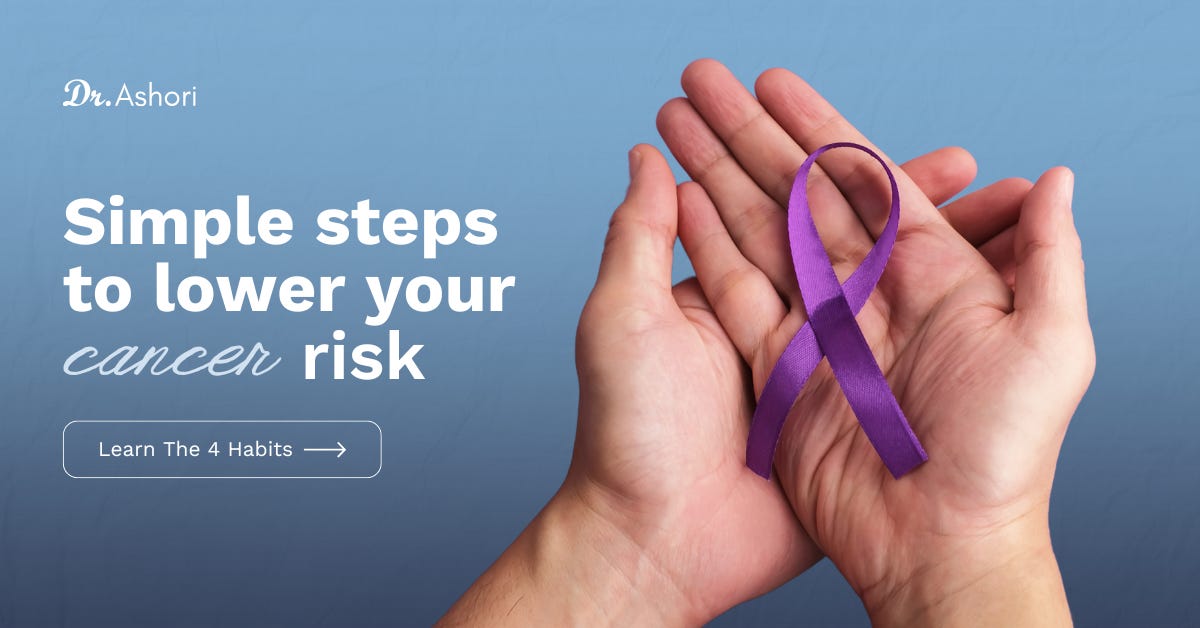4 Steps to Take in Decreasing Cancer Risk
There are evidence-based ways to significantly lower your risk of cancer
This post isn’t about fear but empowerment. It’s about clarity and a positive outlook on your healthy aging journey.
There’s real power in helping you body clear inflammation, delete abnormal cells, and help it recover from stress.
Cancer risk increases with age, but that doesn't mean it's out of your hands. Research continues to show that our environment, diet, movement, and sleep all play a role in how the body responds to potential damage over time.
Here are 4 ways to support your body without falling for quick fixes:
1. Choose More Plant-Based Whole Foods
Fiber and antioxidants help support cellular repair and reduce inflammation. You don’t need to go vegan, just make plants the base. And if you can’t do that, cut out the processed food and keep the high-quality animal based products.
There are no vitamins, no supplements, or peptides that have been proven to help decrease the risk of cancer. But we have strong data to show that a nutritious diet that has a healthy balance of nutrients without excess calories can decrease the risk of cancer.
2. Move Your Body Regularly
Exercise boosts immune function and improves insulin sensitivity, 2 key systems involved in long-term health. It helps with circulation, allowing the cells to function at their best in clearing early precancerous changes.
Insulin resistance is a common problem in modern societies where stress is high, sedentary lifestyles are the norm, and calorie-dense foods abundant. There are no pills, elixirs, or medications that can replace keeping your body activity.
3. Aim for Restful, Restorative Sleep
Deep sleep is when the body does its cleanup work. Better sleep = less oxidative stress and more repair. It doesn’t have to be perfect sleep. But it should be restful. Within 30-60 minutes upon waking up, you should feel refreshed. There should be a slight slump mid-day but not a crash. That’s my definition of good quality sleep.
Medications are effective tools for resetting sleep in severe cases but more studies show that for long-term use, they don’t fully replace the restorative aspects of sleep. 75% of sleep troubleshooting is often sleep hygiene.
4. Know Your Environment
Reduce exposure where it makes sense: smoke, air pollution, ultra processed foods, or harsh cleaning chemicals. You don’t need to live in fear, just be aware. If you can’t do anything about air pollution or microplastics, that’s okay, you can still affect your diet, sleep, and mood.
In Summary of Cancer Prevention
Don’t let anyone scare you into doing something for your health. Screening for cancer have their place and your wonderful primary care doctor hopefully will stay on top of that. But preventing cancer is one step upstream from screening for cancers.
Early detection of the right cancer can save lives. Talk to a doctor you trust about what’s right for your age and family history.
The goal isn’t to eliminate risk, but it’s to reduce unnecessary burden on your body so it can do what it was designed to do: heal, repair, and protect.
If you're feeling overwhelmed or unsure where to start, I help clients create realistic, evidence-based plans for aging well, without fear, fads, or fluff.





